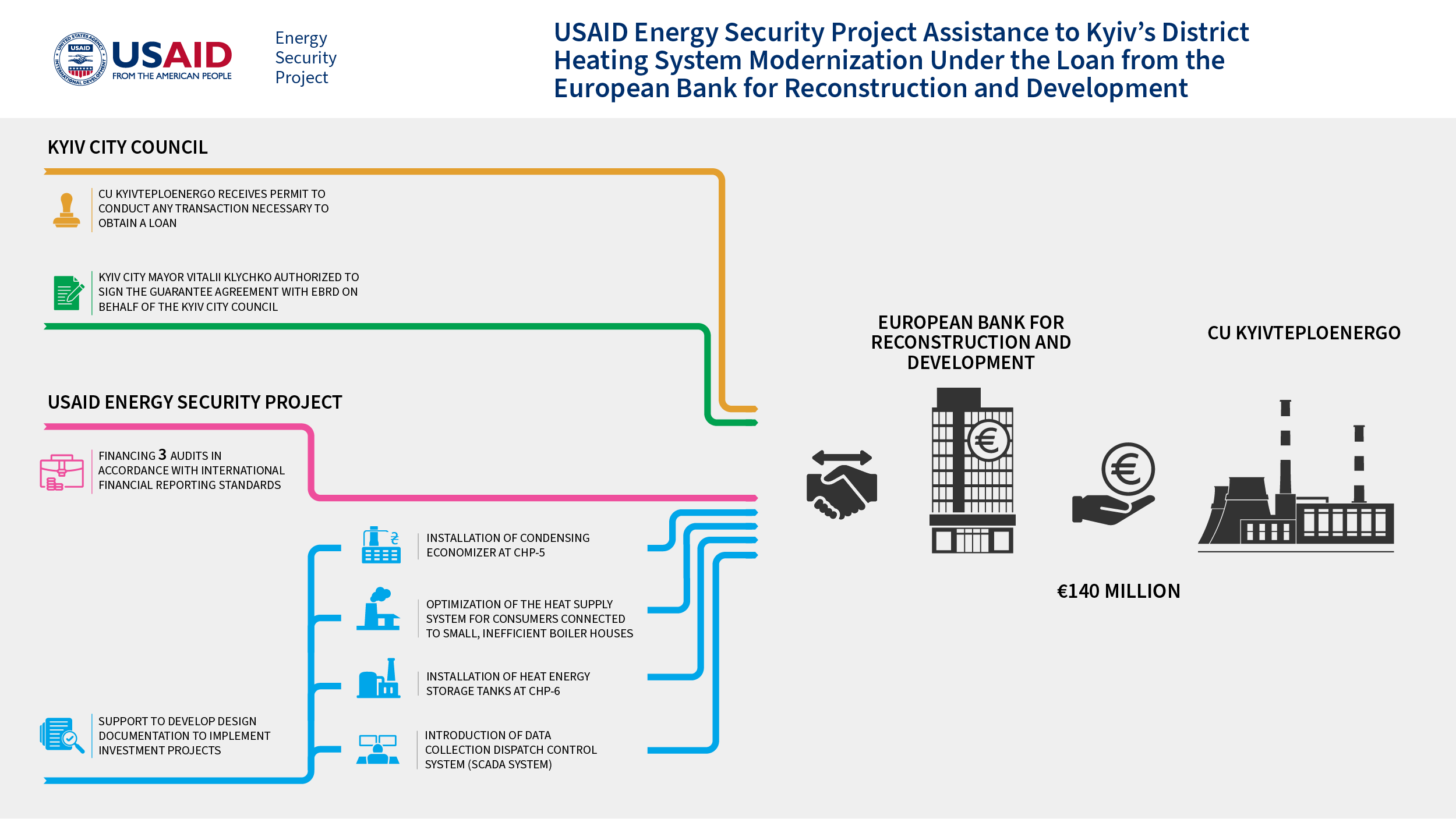The Board of Directors at the European Bank for Reconstruction and Development (EBRD) has decided to grant a loan of 140 million euros to the utility company “Kyivteploenergo” to develop heat infrastructure in the capital city.
This is a large-scale task requiring years of implementation as Kyivteploenergo is one of the world’s largest heat and energy utilities providing district heating services.

The EBRD’s positive verdict followed a whole range of measures and decisions – it took two and a half years from the signing of a Memorandum of Understanding to the decision to grant the loan. At the end of 2018, the USAID Energy Security Project (ESP), along with the Kyiv City State Administration, CU “Kyivteploenergo”(KTE), the EBRD and the International Financial Corporation (IFC), became signatories of the Memorandum that provides for assistance in reforming Kyiv’s district heating system based on the best European practice and in line with the long-term strategy for the development of the city’s heat supply complex. Therefore, we highlight our contribution to preparatory work.
First of all, the USAID ESP funded three audits under International Financial Reporting Standards required for the EBRD approval. ESP also supported a 6-day training program developed for CU “Kyivteploenergo” to improve staff competencies in IFRS and assist in developing accounting policies based on international standards. In addition, the USAID ESP’s experts continue to assist KTE in developing project documentation required to implement a whole range of investment projects.
We recall:
USAID ESP helped to develop projects to optimize heat supply schemes, switching customers of 45 inefficient Kyivteploenero boiler houses to highly efficient heat supply sources. This will enable the city to save 8.1 million cublic meters of gas and 5,700 MWh of electricity annually because of higher quality, reliability and efficiency of heat supply.
USAID ESP assisted КТЕ in developing project documentation for the installation of a condensing economizer at CHP–5. This made it possible to increase the efficiency of the power unit by 10% and save 20.28 million cublic meters of gas annually.
USAID ESP assists Kyivteploenergo’s CHP-5 in the installation of heat storage tanks, coordinating the development of relevant project documentation by the chosen design organization. Heat storage tanks will make it possible not to discharge excessive heat to the cooling towers and thus significantly increase the plant’s efficiency in transient operation, as well as participate in the electricity balancing market without violating the heat production schedule.
USAID ESP helps KTE to prepare the terms of reference for the effective implementation of the SCADA surveillance and data collection system. This system will collect, archive and analyze data, automatically generate reports, record fault signals in real time, calculate the key performance indicators for all KTE’s units generating heat and electricity, as well as individual parts of the heat network that monitor the quality and efficiency of distribution and supply. Therefore, SCADA will make it possible to promptly resolve production, technical and operation issues, improve strategic planning, as well as determine and make optimal decisions related to the production and supply of heat and electricity, technical maintenance and repair, an operating action plan in case of emergency.
The common result of the implementation of all projects is an increase in efficiency. Higher efficiency means both lower costs and more reliable services for customers as well as higher profitability for the company. Moreover, we should keep in mind that 140 million euros from the EBRD is not a gift but a loan, albeit a beneficial loan, and it must be repaid within 13 years. If a modernized district heating system is efficient, all parties will benefit from it: Kyiv residents and CU ”Kyivteploenergo”.
Equally important is the positive “green” effect from the modernization of the capital’s district heating system. That is why the EBRD emphasizes that this project is a part of the Green City Framework-2/GrCF2, aimed to resolve environmental problems in certain large cities.
A general conclusion on the environmental impact by the city’s municipal heat energy company can be made based on the list of Kyivteploenergo’s facilities: two large gas-fired CHPs, 15 large and 168 small and middle-size boiler houses, 2,800 km of heat networks, more than 9,400 heat supply stations, and a waste incineration plant. The installation of a condensing economizer at CHP-5 resulted in a reduction in greenhouse gas emissions by 6.7%. The optimization of the system for heat supply to customers connected to small-size inefficient boiler houses will reduce greenhouse gas atmospheric emissions by 2,448 tons annually. Therefore, the modernization of heat infrastructure is not only about the quality of service and the economy, but also sustainability.
